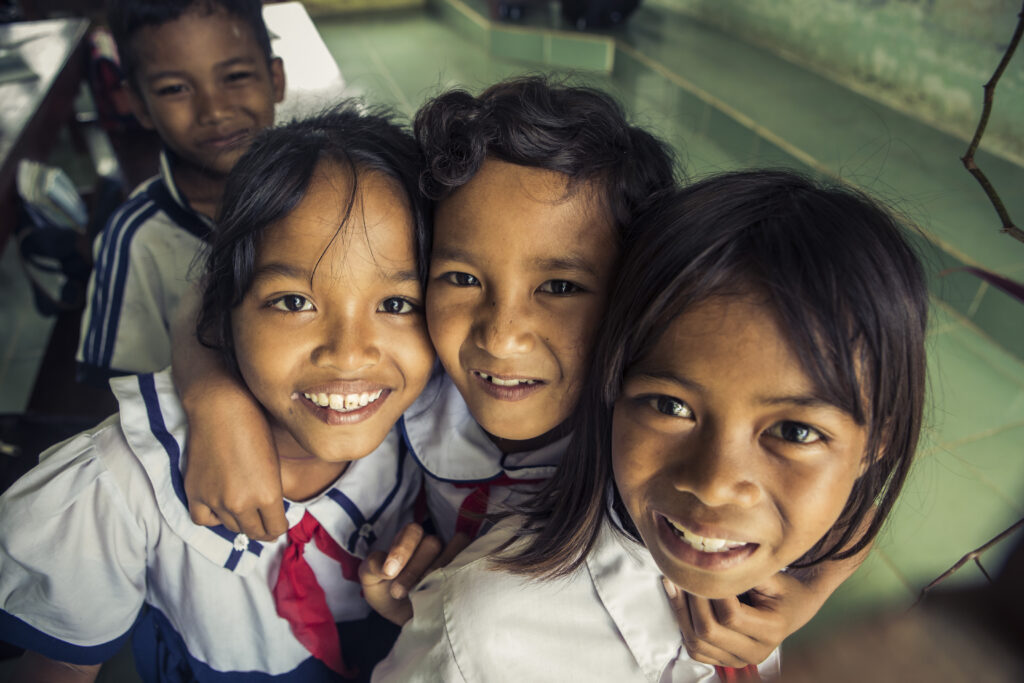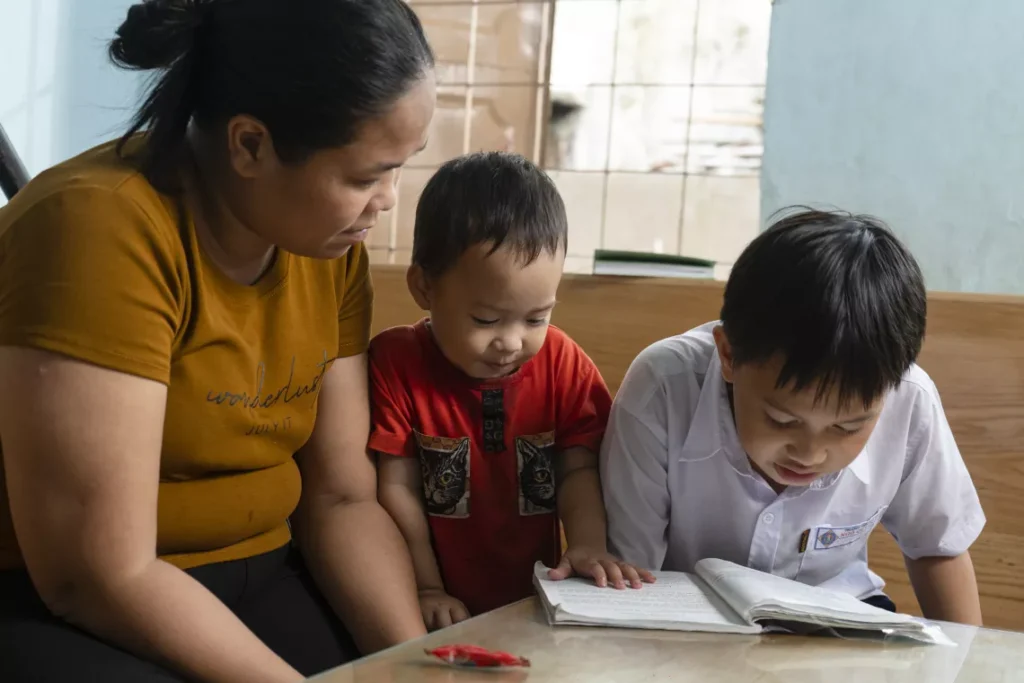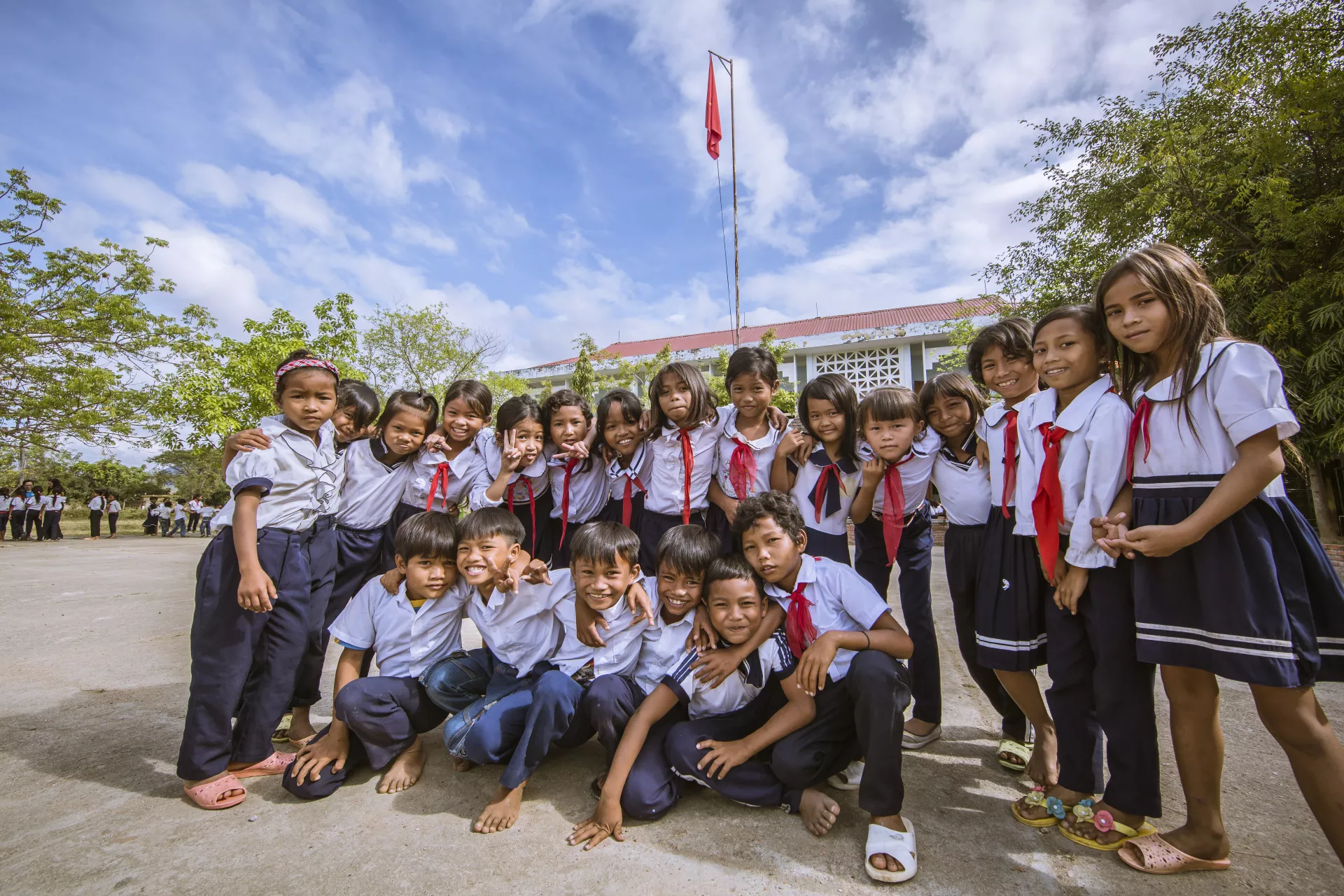Changes
Through its systems-based approach, the WNCB Alliance in Vietnam has taken steps to eradicate child labour in communities. High-level engagement with the national government has resulted in improved national policies, programmes and legislation on child labour.
In our work across sectors and at different levels, raising awareness of the link between education and the risk of child labour has been very important. At the beginning of our WNCB programme, schools and the Ministry of Education and Training did not see their role in the elimination and prevention of child labour. Fortunately, awareness of the importance of education in preventing child labour has grown in the project areas, leading to and contributing to many positive outcomes. Children have better access to education, child protection systems have been strengthened, legislation has improved, there is more cooperation between all stakeholders, child-friendly learning environments help to protect children, and much more.
Systems-based approach for improved capacity in child protection systems
Our systems-based approach to addressing child protection issues, including child labour, proved to have significant results. The systems approach facilitated more systematic policy development and programming that considered the child, the family and the community as a whole. Better coordination of poverty reduction, social welfare, justice, labour and education policies ensured cost-effectiveness and efficiency. A systems approach also addressed the root causes of social exclusion, such as marginalisation and discrimination based on place of origin, ethnicity, gender or other characteristics. Thus, by building the capacity of the child protection system at all levels in Vietnam to address child labour, we aimed to ensure local, long-term and sustainable structural solutions.
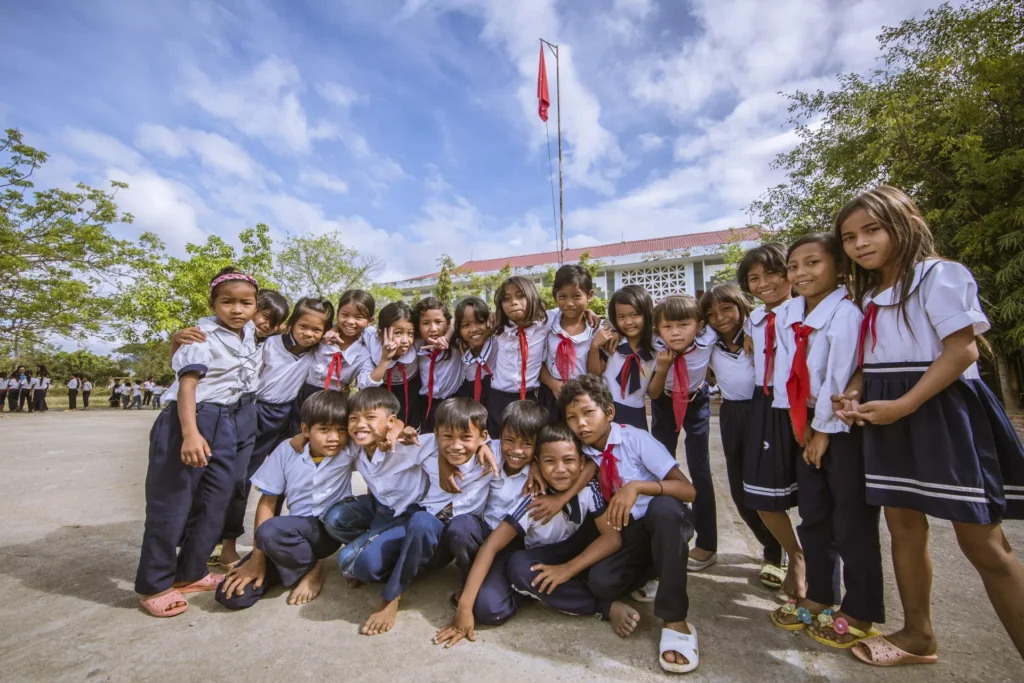
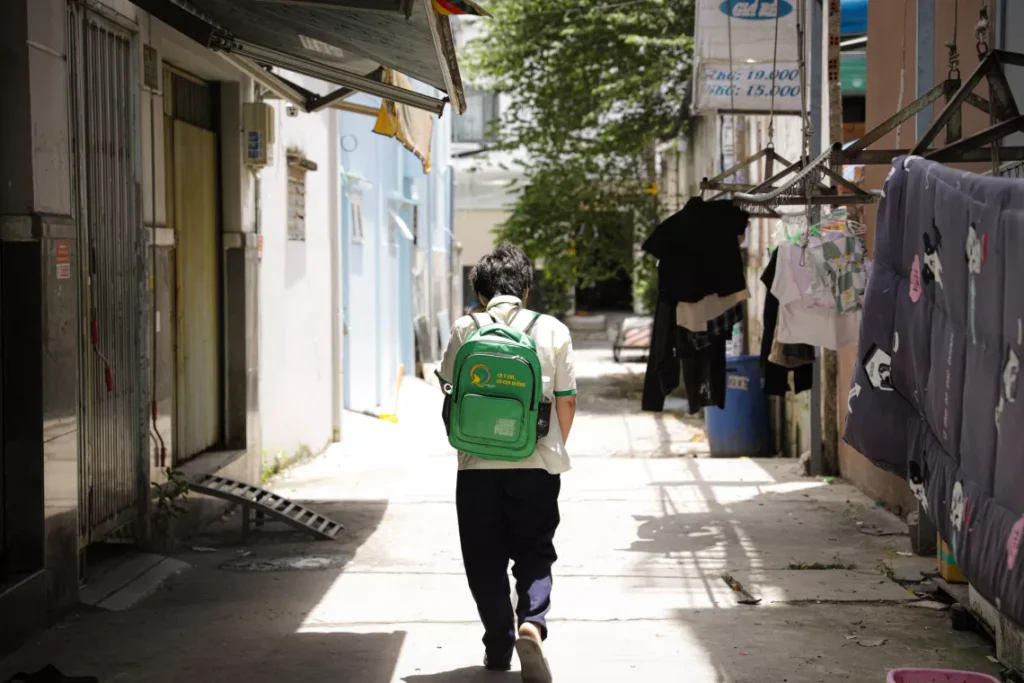
Changes and results at the community level
Children out of work: increased access to education
Scholarships, emergency support and vocational toolkits have transformed children’s access to education, increased school attendance and reduced child labour. We’ve worked with the Ministry of Education and Training to transform 16 secondary schools and vocational schools in Ho Chi Minh City into child-friendly learning environments, ensuring that no child is left behind.
Norms change: raised awareness in the community of childrens rights, child labour and education
We worked with the People’s Committees of four districts in Dong Thap and four districts in Ho Chi Minh City, as well as relevant authorities, to raise awareness and change norms and practices related to child labour in the community.
We took a comprehensive approach, addressing child labour in schools and communities, as well as at the national level. We reached over 10,000 vulnerable children, parents, local officials and teachers in targeted schools. Six mock child labour court cases were conducted by our partners to educate all stakeholders on the risks and legal standards of child labour. This initiative started important conversations, encouraged change and demonstrated how education can stop child exploitation. Child labour is no longer a sensitive issue in schools and communities in project areas.
At the 2023 Ho Chi Minh City Children’s Forum, parents, teachers, children and child protection committee members learned about child protection and child labour regulations. They can now identify and distinguish between child labour and children helping out at home. As a result, many household enterprises have stopped using child labour.
Thanks to the support of organisations, vocational schools, school dialogues and children’s forums, children in Ho Chi Minh City and Dong Thap are more aware of their rights and responsibilities – and they know what to do with this knowledge. Children in the project areas know how to protect themselves, avoid the risk of abuse, make an effort to learn, not give up, practice life skills and plan for the future. As a result, they are far less likely to drop out of school and enter the workforce.
Amplified womens’ voices and status
Mothers and women at risk of child labour are empowered and have more economic resources to improve their families’ financial situation. We have successfully worked with women’s trade unions in targeted districts to help women in poor households combat child labour. This has included providing microfinance, livelihood support and training in financial management and business planning.
A series of market linkage events to help women start businesses and connect with other businesses and trade in the area trained 80 women’s union members and 500 vulnerable women in financial management and business planning. We provided livelihood support to 85 women and microfinance to 72 women, enabling them to develop their businesses. We also organised more than 15 market linkage events in Ho Chi Minh City. These initiatives helped poor women beneficiaries to increase their sales and productivity.
More than 120 teachers, child protection workers and members of women’s associations in Ho Chi Minh City received training on gender sensitivity and the prevention of gender-based violence. The courses gave them a deeper understanding of gender gaps and inequalities, and the knowledge and skills to address them effectively. Our women’s empowerment activities have been shown to reduce domestic violence, violence against children and child abuse caused by financial stress. Our work with mothers and women has led to increased family incomes, fewer children dropping out of school, and a higher status in their families and communities.
At-risk children and vulnerable groups are supported and empowered
Our work in Vietnam has transformed child protection systems, equipping them with the tools they need to eradicate child labour and its interconnected problems. As a result, we successfully placed nearly 3,000 child labourers and at-risk children under child protection case management, providing them with the help they needed, including referrals, access to education, mental health support and social services.
In Dong Thap, we provided vocational support to 580 students and learning kits to 2,700 at-risk children to ensure they stayed in school. In Ho Chi Minh City, we helped 750 vulnerable children and child labourers with school fees and training. Our project gave children the education and training they need to find better jobs and a brighter future away from child labour.
Our work supported children with disabilities in vocational schools, working children, street children and out-of-school children. We helped more than 700 children from poor families at risk of child labour with school fees, study kits and emergency assistance. We also referred 10 children with disabilities in vocational schools to another Save the Children International project to support their small businesses, further empowering this marginalised group.
Changes at the government level
The alliance and its partners have been instrumental in strengthening the national legal framework against child labour and implementing an effective national policy framework. This framework now takes a multisectoral approach to child labour.
Amended Labour Code including a specific chapter on child labour
We used the momentum of the Labour Code amendment and our relationships with government bodies to successfully include a specific chapter on child labour in the amendment. This included new provisions critical to children’s rights, particularly in the prevention of child labour and the protection of underage workers.
Vietnam’s amended Labour Code, which came into force in 2020, clearly aligns the country’s labour legislation more closely with the Convention on the Rights of the Child (CRC), the ILO Minimum Age Convention (C138) and the ILO Worst Forms of Child Labour Convention (C182). This contributes to an improved business climate that supports the prevention of and response to child labour.
Inter-sectoral approach is added to the National Programme on Prevention and Elimination of Child Labour
Our work with the Ministry of Labour, Invalids and Social Affairs (MOLISA) and the International Labour Organisation resulted in meetings and a workshop on the National Programme for the Prevention and Elimination of Child Labour 2021-2025 with a Vision to 2030. The programme, approved by the Prime Minister, successfully promotes a multisectoral approach to child labour in line with the ambitions of WNCB.
Our work has resulted in a stronger national policy on child labour. It effectively encourages different groups such as the Ministry of Agriculture and Rural Development, the Ministry of Information and Communication, the Vietnam Chamber of Commerce and Industry and the private sector to work together, as well as MOLISA.ld labour in the community.
Councellers at schools
We have been working with the Ministry of Education (MOET) to improve social work and counselling services in schools. In a groundbreaking move, Vietnam has introduced national legislation requiring all primary and secondary schools to employ a full-time school counsellor to provide essential psychosocial support to students.
School counsellors are essential for better social services that improve child protection, including mental health care, psychosocial support and counselling. The school counsellor is responsible for coordinating social work and child protection services in schools. School counsellors are an essential part of the child protection system, ensuring that children can stay in school and out of child labour.
MOET approved three guidelines on social work, counselling and child labour prevention and shared them with 7,000 teachers across the country. Our partners helped organise a national workshop to raise awareness of violence against children in schools and child labour prevention.
Child friendly learning environments and improved child protection services keep children in school
Our partners have helped to create child-friendly learning environments in schools in the programme regions, enabling students to learn and benefit from a supportive environment for their optimal development. A child-friendly learning environment removes the pressure to get good grades and greatly reduces the risk of children missing school or dropping out to work.
To date, 21,000 teachers and school counsellors across the country have received training in social work and counselling. They also teach students life skills to prevent abuse, violence and child labour. The Ministry of Education and Training has introduced three training packages and child protection protocols in schools. Child protection officers in project areas are now better able to identify, classify and support children at risk.
With the support of child protection services, 1,200 students in 12 schools in four provinces (including Dong Thap) were able to stay in school. Training for social workers and teachers led to a significant reduction in child labour in HCMC.
Systems-based approach to improve the child protection system
In partnership with MOET, we provided capacity building for schools on child labour prevention and life skills education. This included technical assistance to develop manuals and training materials on issues such as preventing child labour, abuse, violence, exploitation and trafficking, and protecting children online. Better equipped teachers and school staff mean that children who are at risk of child labour can be better identified and protected.
Our partners also supported the training of key teachers and school staff in social work and counselling skills, as they are a key element of child protection systems. Our blended offline and online training reached over 21,000 teachers and education staff after MOET institutionalised three training packages and a child protection protocol in schools.
Changes and results at a community level with local businesses
Businesses are critical to ensuring child protection and promoting responsible practices. The Alliance has worked effectively with businesses and stakeholders to improve their responsible business policies and practices.
Our work with the local business community and Vietnam’s leading business association, the Vietnam Chamber of Commerce and Industry (VCCI), led to significant progress in advancing child rights norms and standards. This included the successful integration of additional child rights criteria into the National Corporate Sustainability Index and a special focus on creating a separate index for small and medium-sized enterprises.
Promoting responsible business practices in Vietnam throughout the whole supply chain
We supported the finalisation of the National Action Plan for Responsible Business Practices in Vietnam, which now includes child-related clauses to protect children and promote their rights.
Our partners worked with several companies, particularly Tier 1 companies, to raise awareness and improve practices to prevent and remediate child labour throughout their supply chains. Through our training on preventing child labour by responsible recruitment and risk management, and remediating child labour in the supply chain, companies are equipped with the knowledge to better protect and promote the welfare and rights of children.
For example, we conducted a one-week capacity building session for business associations to increase their awareness and capacity to promote children’s rights and responsible business practices. Those trained agreed to cascade training and action plans to 30 companies within their lower tier suppliers.
Local businesses implement child protection measures in their supply chains with training and advice from our partners
Our multi-stakeholder approach has fostered collaboration and created an effective ecosystem for responsible business practices, involving brands, consultancies, government representatives and social organisations. Companies are now better equipped to improve their policies and procedures through supply chain mapping, training and consultancy. Examples include child labour prevention and remediation policies, recruitment procedures and child labour management.
Our engagement with business associations and platforms has helped to ensure that children’s rights are mainstreamed into business practices. For example, to highlight the importance of improving employability and creating decent jobs for young people, 160 companies, government agencies and other stakeholders participated in two business forums in partnership with VCCI and formed a skills development network.
Through rigorous consultation, on-site training and support, five participating factories, ranging in size from 100 to more than 5,000 employees, developed action plans and improved HR policies. More than 20 suppliers in their supply chains have been actively involved in the process and have committed to preventing child labour and providing employment opportunities for young workers. Comprehensive training programmes are in place to educate all employees, subcontractors, lower tier suppliers and relevant business partners in the supply chain on policies and procedures to prevent and address child labour. In addition, more than 100 young workers have been thoroughly informed about their rights and needs through policy dialogues and intensive consultations to ensure their well-being and empowerment.
Protection, empowerment and skill development of young workers
Our project to protect and develop the skills of young workers (16-18 years old) had a significant positive impact on legal compliance, preventing abuse of young workers, promoting decent work opportunities and increasing employability. These initiatives addressed the specific vulnerabilities and needs of young workers, emphasising their safety and protection from exploitation, while ensuring they were aware of their rights.
We also provided young workers with the skills and knowledge they needed to find better jobs through our skills training programmes. We worked intensively with companies to train around 15 young workers in skills development and decent work. This will not only improve their individual circumstances, but also have a wider impact on their families and communities.
More knowledge and awareness in the informal sector about child labour
Our partners trained 46 government staff, including child protection officers, women’s trade unionists and Cooperative Alliance staff, to deliver child labour prevention communications to home-based enterprises. They then delivered the child labour prevention communication sessions to 120 home-based enterprises in their area. As a result, 520 home-based enterprises in Dong Thap and HCMC increased their knowledge and commitment to the elimination of child labour.
Collaboration with Vietnam Chamber of Commerce and Industry advanced child rights reporting
Working with the Vietnam Chamber of Commerce and Industry (VCCI) has led to significant progress in child rights reporting. Our partners successfully advocated for the inclusion of additional child rights criteria in the National Corporate Sustainability Index. These criteria include indicators on corporate policies and actions on child labour, prevention and remediation of child exploitation and abuse, child labour protection and skills development, and family-friendly workplaces. These efforts have demonstrated VCCI’s strong commitment to promoting child rights actions by its 200,000 business members.
